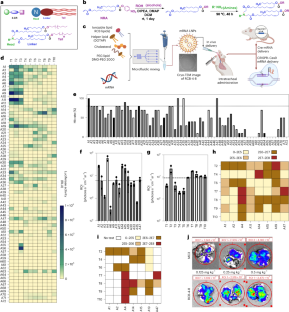このRNA送達粒子を用いて、嚢胞性線維症やその他の肺疾患の新しい治療法を開発することが期待されます。 Using these RNA-delivery particles, researchers hope to develop new treatments for cystic fibrosis and other lung diseases.
2023-03-30 マサチューセッツ工科大学(MIT)
この粒子は、プラスに帯電したヘッドグループを持ち、マイナスに帯電したmRNAと相互作用して、粒子が細胞内に入ると、粒子を飲み込む構造から脱出するのを助ける役割を果たします。脂質の尾部構造は、粒子が細胞膜を通過するのを助ける。
研究者らは、この粒子を嚢胞性線維症やその他の肺疾患の吸入治療薬として開発することを期待しています。
この技術は、マウスでRNAを肺に高効率で送達することを初めて実証したと説明されている。
<関連情報>
- https://news.mit.edu/2023/new-nanoparticles-can-perform-gene-editing-lungs-0330
- https://www.nature.com/articles/s41587-023-01679-x
肺へのmRNA送達とゲノム編集のためのナノ粒子のコンビナトリアルデザイン Combinatorial design of nanoparticles for pulmonary mRNA delivery and genome editing
Bowen Li,Rajith Singh Manan,Shun-Qing Liang,Akiva Gordon,Allen Jiang,Andrew Varley,Guangping Gao,Robert Langer,Wen Xue & Daniel Anderson
Nature Biotechnology Published:30 March 2023
DOI:https://doi.org/10.1038/s41587-023-01679-x

Abstract
The expanding applications of nonviral genomic medicines in the lung remain restricted by delivery challenges. Here, leveraging a high-throughput platform, we synthesize and screen a combinatorial library of biodegradable ionizable lipids to build inhalable delivery vehicles for messenger RNA and CRISPR–Cas9 gene editors. Lead lipid nanoparticles are amenable for repeated intratracheal dosing and could achieve efficient gene editing in lung epithelium, providing avenues for gene therapy of congenital lung diseases.


